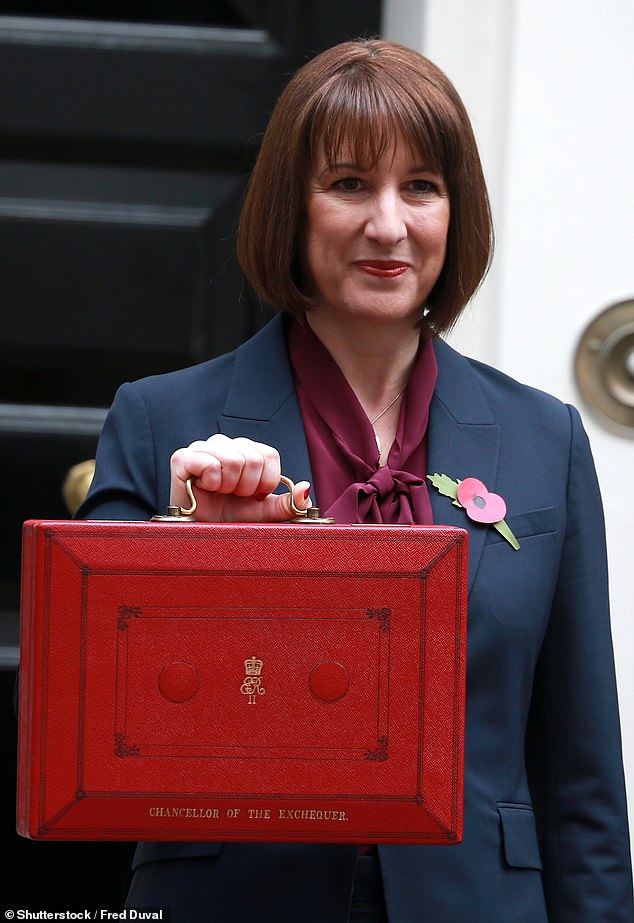[ad_1]
- Gilts endure volatile week amid concerns about the UK’s public finances
- Tide could reverse thanks to ‘good fortune’ or tax hikes, says UBS
UK government bonds endured a volatile week as initial doubts over the Chancellor’s future and concerns about the country’s finances rocked investor confidence.
Lacklustre economic growth, and an inflation rate trending above the Bank of England’s 2 per cent target, has seen investors sell longer-term gilts and driven yields – the interest on government debt – much higher over the last year.
The watering down of the Government’s welfare reforms and the winter fuel allowance u-turn has left a multi-billion pound gap in Britain’s finances.
Rachel Reeves could now be forced into tax hikes or painful spending cuts elsewhere if she is to stand by her fiscal rules and avoid the need for even more borrowing at high rates of interest.
Ten-year gilt yields have risen 43 basis points over the last 12 months to 4.56 per cent, while 30-year yields have risen 72bps to 5.4 per cent.
But analysts at UBS think the trend could reverse as Reeves prepares to make tough decisions this autumn.

Reeves could be forced into manifesto pledge-breaking tax hikes this autumn
They wrote in a note on Monday: ‘As we emerge from another volatile week for gilts, we think it is right to stay long.
‘The adjustment to the welfare spending bill has increased pressure on the public finances…[and] the question for UK rates is now about how that resolves: the potential for more borrowing, more taxes or some degree of better fortune.’
The Chancellor could avoid the need for manifesto pledge-busting hikes to in-work taxes if the consumer price index, and therefore UK base rate, falls more quickly than currently anticipated.
CPI was at 3.4 per cent for the 12 months to May and the BoE has consistently said it will take a slow-and-steady approach to further interest rate cuts to ensure inflation remains under control.
The bank is currently forecast to cut base rate on two more occasions this year, taking base rate from its current level of 4.25 to 3.75 per cent by year-end.
UBS thinks a ‘sustained drop’ of 100bps to 3.25 per cent would save £5billion a year in 4 years’ time, while a similar fall in 10-year gilt yields would restore nearly £10billion of fiscal headroom.
UBS said: ‘If a degree of good fortune (lower rates as the inflation outlook improves) is not forthcoming, we think that the potential for tax rises seems more likely than a change to the fiscal rules to fall back on borrowing that the market has made very clear it will not accept.’
If taxes are hike, UBS expects fiscal drag – the impact of more people falling to higher tax brackets – to ‘make the path to lower front end rates easier’.
UBS said: ‘Lower front-end rates and adherence to the fiscal rules would then support long-term rates.’

The Bank of England has been selling gilts at a pace of £100m per year
Pressure on long-term gilts
UBS analysis also shows how the demographics of gilt investors has changed since the BoE started its quantitative tightening programme of selling bonds bought in the wake of the global financial crisis.
Foreign investors are now the biggest buyers of UK government debt, followed by domestic pension funds.
Chris Turner, FX analyst at ING, said suggestions from the Bank of England that it could slow its £100billion per year gilt sales programme in September ‘could help gilts’.
But Gilles Moëc, group chief economist at AXA Investment Managers, thinks markets will be focused on Reeves’ next steps.
He said: ‘The hiccup on the British bond market reflects global investors’ exacerbated sensitivity to fiscal trajectories and should act as a reminder that there can be a high price to pay when governments are hesitating on their overall macroeconomic narrative.
‘Without the reforms of the social benefits, sticking by her rule without consenting to tax hikes is now next to impossible. Accordingly, the British 10-year yield, as of last Friday, had not fully retraced. The UK’s public finance trajectory – and overall macro strategy – remains under surveillance.’
DIY INVESTING PLATFORMS

AJ Bell

AJ Bell
Easy investing and ready-made portfolios

Hargreaves Lansdown

Hargreaves Lansdown
Free fund dealing and investment ideas

interactive investor

interactive investor
Flat-fee investing from £4.99 per month

InvestEngine

InvestEngine
Account and trading fee-free ETF investing
Trading 212
Trading 212
Free share dealing and no account fee
Affiliate links: If you take out a product This is Money may earn a commission. These deals are chosen by our editorial team, as we think they are worth highlighting. This does not affect our editorial independence.
[ad_2]
This article was originally published by a www.dailymail.co.uk . Read the Original article here. .

